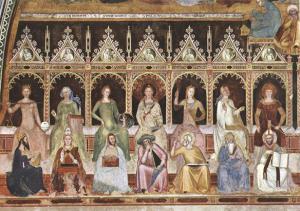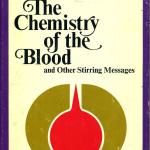A good life is more than pragmatic, but does take into account what works. If we are just pragmatic, we may lose the truth. Sometimes ideas seem to work, but the “seeming” is deceptive or based on too limited a sample! God’s opinion surely counts as does His judgment for eternity.
We all agree we should be wise, but being wise is hard. Wisdom is an excellent Beloved, even if none of us will see her clearly until Paradise. We follow in her steps, Lady Philosophy*. Recently, I got two suggestions about finding wisdom, one common, but not so helpful, one based on ancient wisdom that was very correcting.
Wisdom and Truth: Not Just Pragmatic
Talk of Wisdom sounds too ethereal to some. Since I am given to loving what my dissertation advisor called “flowery” language, I should listen to such criticisms carefully. Maybe we should just do “what works” without any talk about ‘truth’ and certainly none about “Lady Philosophy!”
As one person commented on some of my thoughts on beauty and goodness:
Truth, knowledge, and science are pragmatically the same e.g. what works. When old knowledge stops working, it is up to science and statistical data to discover why the old knowledge failed. Something changed.
If “truth, knowledge, and science” are pragmatically the same, then why should I use science and stats to tell me why “old knowledge” does not work? There are other ways of human knowing, even if we do not count divine revelation. The arts reveal deep truths about the cosmos and beauty. Why not prioritize that way of knowing?
Perhaps we should do so because of the pragmatic successes of science: making life better with everything from vaccines to violins. Yet to do so we would have to leave aside the pragmatic failures of science: creating technology that allows for viruses to travel more quickly globally or giving us fearsome weapons of mass destruction. We cannot credit the good to science and ignore the bad without noting that science is done by scientists and not angels. We have good reason not to trust their moral judgement over any other class.
Science and sociology might tell me that the “old knowledge” is not working even why it is not working, but will do nothing to tell me if it should work. Science and sociology might be able to suggest the best means to make the “old knowledge” work again, but not whether I should wish this to be so. Maybe there is not “truth” about what is good, other than what works, but shouldn’t we all be sure before we say this is so? After all, many societies none of us wish to live in seemed to “work” for some members, though not for others. What counts as knowledge “working?” Does the prisoner in the gulag count equally to Stalin in our studies? If so, who says so?
Nobody would be comfortable with saying: “I will challenge my ideas when they do not work for me.” The majority by numbers might “benefit” from Jim Crow, but surely the system was evil. In the early days of the twentieth century, some scientists valued artificial environments over natural ones. Why was this wrong? If two courses of action both carry benefits, then who decides what is best? We used to be told that we should strive to change the environment, now we are cautioned not to do so. The outcomes of actions we take can be given by the scientists, but our values will inform which we choose.
This does not mean that another class, priests, politicians, or professional philosophers, should be left in command. All of us are human. As a group, taking all the wisdom we can find, using all the good methods out there, we do what we can to seek wisdom, truth, and knowledge.
“Surely if we just get our values right, hard work, and our methods down, then all will be well!” This is not so as there are many examples of people setting out to do the right thing with the best methods known and still going badly awry. The history of charitable organizations is littered with people using best science and fine ethical ideas and ending up making a mess.
The mess matters.
On Babies and Bathwater
A wise academic pushed back against an argument I was making cautioning not to “throw out the baby with the bathwater” when considering a serious cultural critique, especially from someone who disagrees with some foundational ideas. Suppose the argument is unsound, noting this might be useful, but not if it distracts from dealing with a terrible problem. It is wise to pause over a disagreement in the soundness of the argument to ask what motivated the argument. What is the bottom line based on the ethical ideals one holds?
Better to pause and work to fix the problem. Sinclair even should be thanked for exposing such errors.
Pragmatically, the more a person loved free markets, the greater the danger in allowing such evils to continue. If revolutions are generally bad, reactionaries father revolutions through festering social ills unaddressed and unended. The evils of the “dark Satanic mills”**also should have given a seeker of wisdom serous pause. Were the Christian socialists right after all? Merely nattering about Sinclair’s errors was not good enough: saying “mistakes were made” will not work.
Personally, at this is most important, the Gilded Age vices harmed people in God’s image. Since people are more important than ideas, solutions to the terrors of the meatpacking industry and Gilded age excess must be the focus! Christian ethics, assuming one begins with Christian ethics, demand love for one’s neighbor and treating one’s neighbor as one wishes to be treated. In the case of the robber barons, a Christian need not and should not defend their evil practices. If generally free market solutions, guided by ethics, are the best of all flawed solutions, then finding the solution is the best advice.
One need not embrace bad arguments, even can comment on them if briefly, but stand in solidarity against with the suffering and support those doing something. The slave labor from which we benefit, legalized abortion, institutional racism, or corrupt religious structures remain in our day, in our own camps, to receive our primary energy.
*See a book good for our times, the Medieval best seller, The Consolation of Philosophy. Boethius understood how easily we confuse our ideas with Wisdom.
**Blake may have meant Dante’s vision, but surely the evils Dickens’ describes, the factories of Coketown, and the schools that defended them, were Satanic.
***I am thankful for a much admired Christian scholar for setting me to thinking on this topic. I appreciate the wisdom, leaving her unnamed so she needn’t associate with my views.

















